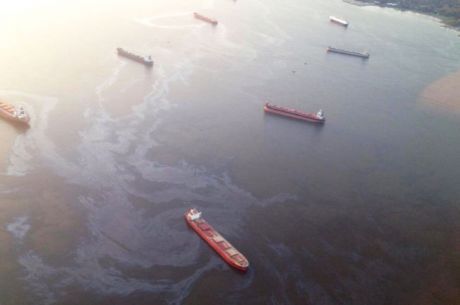News
You are here
Reliance on fossil fuels leads to yet another spill

April 15, 2015
A ship on its way to pick up grain spilled 2,700 litres of fuel into Burrard Inlet. This is the same area that the proposed Kinder Morgan pipeline will increase oil tanker traffic from five oil tankers per month to 34 per month. Each of these will be able to hold nearly 140 million litres of oil.
Everything about this spill points to the hazards of using and transporting fossil fuels and the disregard of all levels of government to this danger.
The kilometre long oil slick due to the spill was not discovered by any official agency. The spill was reported by a person in a sailboat who happened on the oil slick at around 5 pm. It took the Coast Guard three hours to decide that the spill was serious. Spokes people for the Coast Guard have changed their story about how long it was until they were able to set up a boom to try to contain the spill. Initially they said it wasn't until 2AM, but since then they have revised that to 12AM. Roger Girouard, Canadian Coast Guard assistant commissioner, told CBC News that the first few hours after an incident are murky. If the 12 PM estimate is correct it was 7 hours before the spill was dealt with.
This was in pleasant calm weather within site of the largest city in the province. Imagine how long it will take to deal with spills that occur off the coast in rough weather.
The city of Vancouver was not notified about the spill until 13 hours after it happened. The Premier and the Coast Guard have been squabbling in the media about whether it is the responsibility of the province or the Coast Guard to notify the cities effected by spills.
The oil reached North Shore beaches, Sandy Cove, Ambleside, New Brighton Beach and beaches in Stanley Park. The City of Vancouver has advised people and their pets to avoid the water or shoreline around English Bay and Stanley Park until further notice. It's not clear how wildlife can be expected to obey these guidelines.
The Kitsilano coast guard base in Burrard inlet was closed last year by the Harper government despite many protests pointing out the increased response times that would result. This base was the busiest in Canada and responded to around 250 calls per year.
Despite the time lag, finger pointing, and fouling of beaches, the federal minister of Industry, James Moore, whose riding is adjacent to the inlet, described the spill response as first class.
Section:










